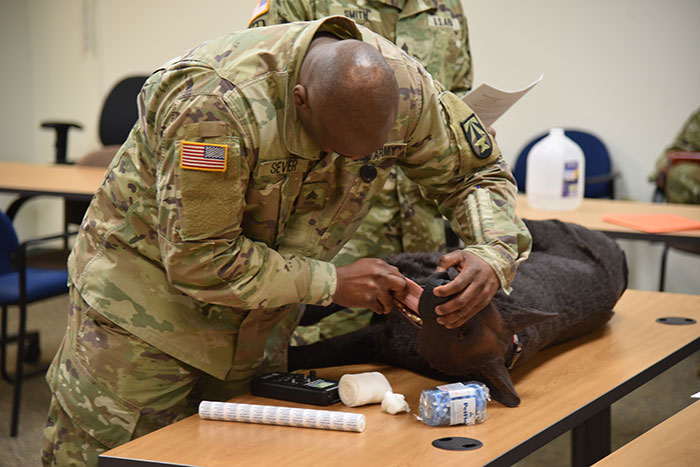Life, Career, More: 68Ts Gather for Guidance, Camaraderie

The U.S. Army Medical Research and Development Command held its second annual 68T Leader Forum from March 13 to March 15 at Fort Detrick, Maryland. The event, billed as an opportunity for Army Animal Care Specialists to collaborate with contemporaries, discuss burgeoning medical techniques and further delve into the specifics of their chosen career fields, was attended by more than two dozen Soldiers from across MRDC.
"This week is about communication, about developing relationships and sharing your experiences with each other," said Brig. Gen. Tony McQueen, Commanding General of MRDC and Fort Detrick, in an address to the attendees on March 13. "You are a small MOS, but you all have a tremendous impact on the military. That's why we wanted you here, to show you how much you mean to this organization."
The early portion of the event centered chiefly on supporting the mental and physical health of animal care specialists themselves, with a keen focus placed on the unique –and sometimes frustrating – convergence of those aspects within the confines of the position itself. Specifically, forum leaders placed a premium on brainstorming ways to quell feelings of isolation within the Army (due to the substantial amount of lab and research work associated with the role), as well as ways to feel connected to both the military and external communities as well.
"There's an overwhelming amount of things you're always thinking about as a 68T – there's always a list you're carrying with you," said Staff Sgt. Karla Lopez, a 68T assigned to MRDC's Walter Reed Army Institute of Research, who noted during an open discussion session the difficulty in treating patients who cannot physically explain where, exactly, they need treatment. "Since you're caring for animals that can't communicate with you, you have to carry that list – that weight – for those animals as well," said Lopez.
To that end, instructors also spent a substantial amount of time talking about methods to cope with "compassion fatigue" – which is, in this case, the overwhelming stress and exhaustion resulting from a near-constant exposure to traumatized military working dogs. Forum leaders – along with McQueen himself – encouraged attendees to use the connections developed over the course of the three-day event to build peer groups capable of alleviating those stressors.

"It's important to sit down and listen and learn from other peoples' experiences and perspectives," said Sgt. Ashton Sevier, an animal care specialist at MRDC's U.S. Army Military Research Institute of Infectious Diseases. "I'm always telling that to my Soldiers – that everything is a learning experience."
The latter portion of the forum was dedicated to hands-on training, which included a wide-ranging discussion of current military care protocols. Using a canine simulation manikin, attendees reviewed animal care concepts ranging from basic first aid to dehydration awareness to tourniquet application. Regarding the latter, MWDs notably require specially-made tourniquets as those designed for human use place too much pressure on a dog's limbs, organs, and musculature.
"Our field is constantly changing, and so we're constantly learning," said Sgt. Cynthia Jarvi, a 68T currently stationed at WRAIR. As a veterinarian in the civilian world prior to her current 12-year Army career, Jarvi is keenly aware of the evolving nature of animal care. "There's always a new technique, some new information, a better way to help take care of these important animals."
According to McQueen, MRDC plans to offer a third annual iteration of the 68T Leader Forum next year, with the event continuing on an annual basis moving forward.
 An official website of the United States government
An official website of the United States government
 ) or https:// means you've safely connected to the .mil website. Share sensitive information only on official, secure websites.
) or https:// means you've safely connected to the .mil website. Share sensitive information only on official, secure websites.


